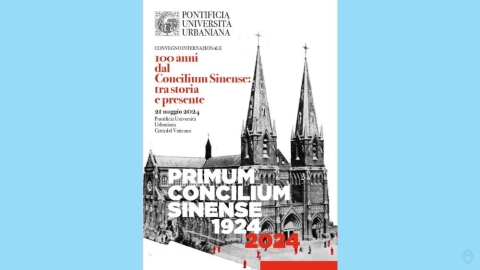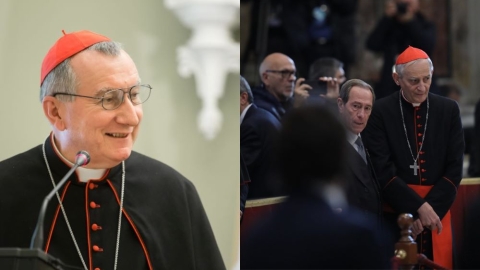Saying the Rosary Well

The Virgin Mary has urged us, in each of her apparitions at Fatima, to say one third, or one set of mysteries of the Rosary every day. The month of October provides an opportunity to seek to better respond to this message from Our Lady.
It seems painful to some to repeat the same prayers over and over again. Yet the repetition of a formula always enhances the art of praying; it helps to soothe the senses and gently fix the gaze on invisible things. It is difficult to fix one's gaze on an object, without becoming tired or distracted by the mobility of the mind.
The “Hail Mary,” by its simple and regular repetition, supports the movement of the soul. That's a small thing, isn't it? But many movements of the soul and of the heart – like admiration, or love – are expressed just as well, or even better, by words that are repeated over and over again. When words know they are powerless, they like to repeat themselves.
Two sides of the salutation
The “Hail Mary” includes two parts and two very different orientations of prayer.
The first part, which unites the words of the angel Gabriel with those of St. Elizabeth, is a movement of admiration and praise. Through the first words, the soul uses words of which God Himself is the author – since St. Gabriel spoke in the name of his Lord who sent him – and by which He reveals to us that the interior of Mary surpasses all another creatures in grace and natural beauty.
The second part of the Hail Mary is a humble plea, which reminds us of our state as sinners and the fragility of our earthly condition: “now and at the hour of our death.” The alternation of these two parts represents the paradox of our condition and our vocation: we are all made up of a mixture of misery and light, of moaning and rejoicing.
Meditation on the mysteries
If our rosary is only a succession of Hail Marys, as beautiful as this prayer is, it risks becoming a mechanical and soulless prayer. We must say our rosary as it should be said, contemplating what are called the “mysteries” of the Rosary: Gospel tableaus within the reach of each of us, which bring to life before our eyes episodes of the lives of Our Lord and Our Lady.
Each of these tableaus is a door opening onto salvation history. And what joy it is for the Christian to think of the mysteries of our salvation! To the rhythm of the Paters and Aves, the scenes from the life of Christ and His Mother gradually become our own story. It is we who, with Mary, seek and find the Child Jesus in the Temple; or it is we who receive, with Mary, in the midst of the apostles, the tongues of fire on Pentecost.
Let us listen to what the great Cardinal de Bérulle (1575-1629) said of these mysteries: “They are past as to execution, but they are present as to virtue; and their radiance never passes away: nor will the love with which they were wrought ever pass away, the efficacy and virtue which makes these mysteries alive and operative in us.”
“Even to present tastes, the lively disposition with which Jesus operated this mystery, is always lively, timely, and present to Jesus. This obliges us to treat the things and mysteries of Jesus not as things passed and extinct, but as things living and present, and even eternal, and from which we must also gather a present and eternal fruit.”
In our century of subjectivism, the Rosary brings into opposition an objective piety which is interested first of all in God and His Mother. The humble recitation of the Rosary forces me out of my little human world; as the prayer progresses, my gaze adapts to the mystery, is purified and elevated.
The acts of Christ's life all having a redemptive value, each scene communicates to our soul according to its needs, a grace of union and resemblance to Jesus, a virtue corresponding to the mystery contemplated. Simple method, but very rich, wonderfully balanced, and powerful in its simplicity.

How to recite the Rosary?
Here is some advice or indications to help us say this beautiful prayer well and make our rosaries fruitful.
First, do not try to weigh each word; let the recitation slip from your lips, maintaining your gaze on Our Lord or on the Blessed Virgin, with gentleness and perseverance.
Avoid analyzing and discoursing: this agitates and tires. It is enough to unite yourself with the feelings of Jesus or Mary in the mystery in question. Bring to it the simplicity of heart and spirit of childhood.
Push aside distractions gently, patiently, undeterred. Our Lady knows our weaknesses and will reward our efforts. On days of drought, accept that our recitation seems only material to us. Humbling ourselves, we must be patient and try to remain peacefully reaching out to those to whom our prayers are addressed.
To help us chase away distractions, St. Louis-Marie Grignion de Montfort advises us to always have in view, while reciting each decade or our rosary in general, some grace to ask for, some virtue to imitate, some sin to destroy for us or for our neighbor. Indeed, when we have something to obtain from heaven, we are always more attentive.
Consider the repetition of the blessed names of Jesus and Mary as a most effective remedy against our miserable inclinations. A simple look of faith at the mysteries is equivalent to touching the hem of Christ's garment: “If only I can touch the hem of His garment, I will be saved… (Mt 9:21) A virtue came from Him which healed them all. (Lk 6:19)”
The best disposition for reciting the Rosary well is obviously faith: faith in the reality contemplated, faith and trust in a prayer that the Most Blessed Virgin has so often recommended, filial trust, admiring and loving contemplation of this world of beauty that is the Hearts of Jesus and Mary.
Our prayer will bear fruit insofar as we have the firm conviction that, as soon as we grasp our Rosary with faith, we are put in communication with the Virgin Mary and we will obtain many graces from her who is our Mother and our advocate in heaven.
Being in communion with the mysteries
The word “meditation” in connection with the mysteries can be misleading. In reality, it is less an intellectual discourse about scenes from the life of Jesus, than an effort of being in communion with the reality of the mysteries.
Fr. Vayssière (1864-1940), a Dominican religious, wrote: “Recite each decade, less with reflection than by communing, above all through the heart, with the grace of mystery, with the spirit of Jesus and Mary such as the mystery presents it to us.”
For example, it is a case of reliving the mystery of the Annunciation by asking the Blessed Virgin to bring us into the spirit of humility which was hers at the moment when the angel announced to her that she would be the Mother of God, so that this spirit of humility will permeate our lives.
Fr. Vayssière liked to make the connection with Eucharistic communion. Just as communion transforms us into the one we receive, Our Lord Jesus Christ, the Rosary will transform us into the one we contemplate in the mysteries, Jesus Christ; and He brings about this transformation through the maternal action of Mary. The Hail Mary puts into action Our Lady’s maternity of grace, by which she transforms us into her Son Jesus.
Respond to our Mother's call
The insistence with which the Blessed Virgin recommended this prayer indicates that it was she who inspired it. Let us respond to her urgent appeals, and make the resolution for this month to say our rosary more and better.
And since good habits are going to support our loyalty, let's set a regular time to start it. Let us get off the phone for twenty minutes. Since it is often easier to keep a resolution together, let us join with others to recite this prayer.
The Church recommends reciting the rosary in common, especially where it is easiest, in the family. A family that says the rosary is blessed from heaven: “The custom of the family recitation of the Holy Rosary,” said Pius XII, “the Rosary, recited in common, assembles before the image of the Virgin, in an admirable union of hearts, the parents and their children, who come back from their daily work.”
How many graces are contained in the Immaculate Heart of Our Lady, which only ask to be poured out on us and on our families as long as we ask for them in prayer!
- Fr. Hervé Gresland
(Source : La Couronne de Marie, n° 113 – FSSPX.Actualités)
Illustration 1 & 2 : Flickr / Fr Lawrence Lew, O.P. (CC BY-NC-ND 2.0)





